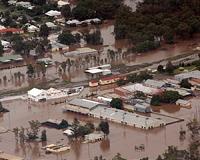| . |  |
. |
Itaipava, Brazil (AFP) Jan 18, 2011 A week after the deadliest mudslides in its history which killed nearly 700 people, Brazil Tuesday was still counting the dead and struggling to bring aid to survivors. The death toll kept climbing as emergency crews finally managed to pass some blocked roads to recover bodies from remote villages in the Serrana region near Rio de Janeiro. As of late Tuesday, a total of 680 dead had been tallied, according to officials. At least another 200 people were missing. Seven hundred military personnel have been sent to the disaster zone, to help 800 emergency workers already there, fanning out by four-wheel-drive or helicopter to reach isolated communities, several of which were wiped off the map. "I'm never going back there to live. Death will always be in that place," one survivor rescued from the village of Vale de Cuiaba, Roberto Fabiano Augusto, told AFP after he was brought by helicopter to the nearby town of Itaipava. More than 50 people died in his village, he said. His family managed to escape, but his neighbors did not. "A lot of my childhood friends died. I don't want to go back there to live," he said. The commander in charge of air rescues, Commander Luis Antonio Pinto Machado, said "there are still at least 10 areas cut off, which have populations from 500 to several thousand." From the air, the landslides were easily seen: red scars on mountains beneath which layers of debris lay. Houses that were in their path looked as if they had been blasted apart by explosives. Residents were seen pleading for help from the helicopters flying over their heads. When crews descended, they dropped off food and first-aid kits. But in many cases, locals wanted to stay where they were, to secure what was left of their homes. The government has pledged $450 million in aid, $60 million of which has been released immediately. Brazilian media called it the worst disaster of its type in the country's history, surpassing mudslides in a coastal town that killed 437 people in 1967. The catastrophe struck in the early hours last Wednesday as families were sleeping. Seasonal rains, normally heavy anyway, suddenly intensified unimaginably because of a cold front, dumping a month's worth of water in a few hours. As the water slipped under the soil on the region's steep granite hillsides, the surface gave way, sending avalanches of mud, trees and big boulders crashing down into valley communities, wiping some of them out entirely and killing hundreds. Houses illegally built on the hillsides -- many of them by poor people occupying public land -- were immediately destroyed, and added to the deadly mass speeding downhill. The towns of Nova Friburgo, Teresopolis and Petropolis -- tourist destinations that used to be aristocratic getaways for 19th century Brazilian nobility -- were the worst hit. Outlying villages were cut off as more than a dozen roads crumbled away or were covered with debris. For the past few days, military helicopters have been sent out to those isolated areas, rescuing injured survivors and delivering desperately needed food, water and medicine. Authorities have warned that epidemics are now a real danger. Bodies are decomposing badly in the tropical heat, and bacteria and parasites normally present in the waterways are multiplying. Officials cautioned the local population to not drink contaminated runoff water. Around 17,000 people were being put up in shelters or staying with relatives after losing their homes or having to abandon at-risk areas. Brazilian President Dilma Rousseff on Saturday declared three days of national mourning. Rio de Janeiro state from Monday started observing a longer, week-long period of grieving. Rousseff and state officials have said the death toll was so high because decades of weak municipal oversight in the region permitted the expansion of towns and villages into unstable areas. But the mayor of Petropolis, Paulo Mastrangi, hit back, saying "there was no mechanism to be warned of a disaster of this magnitude." He added local officials were now working on plans to stop people living in areas at risk from mudslides "to prevent future tragedies." Ordinary Brazilians were also rallying to help the devastated population, sending donations of food and clothing to the disaster zone.
Share This Article With Planet Earth
Related Links Bringing Order To A World Of Disasters When the Earth Quakes A world of storm and tempest
 Costs mount in savage Australia floods
Costs mount in savage Australia floodsHorsham, Australia (AFP) Jan 18, 2011 Floodwaters claimed the life of a young boy in southern Australia Tuesday as Canberra urged big business to dig deep for a recovery analysts warned could cost Aus$20 billion ($19.7 billion). Prime Minister Julia Gillard turned to corporate Australia for help in what is expected to be the nation's costliest ever natural disaster - a deluge that has lashed five of its seven states, killing mo ... read more |
|
| The content herein, unless otherwise known to be public domain, are Copyright 1995-2010 - SpaceDaily. AFP and UPI Wire Stories are copyright Agence France-Presse and United Press International. ESA Portal Reports are copyright European Space Agency. All NASA sourced material is public domain. Additional copyrights may apply in whole or part to other bona fide parties. Advertising does not imply endorsement,agreement or approval of any opinions, statements or information provided by SpaceDaily on any Web page published or hosted by SpaceDaily. Privacy Statement |